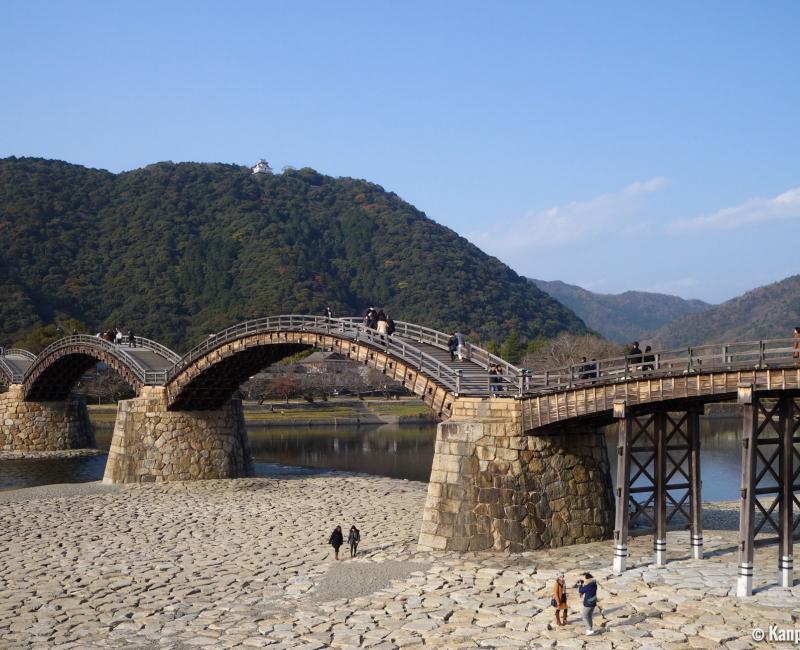Iwakuni
The feudal city of Kintaikyo Bridge
Iwakuni is a 17th century small Japanese town, located in Yamaguchi prefecture, south-west of Hiroshima. Its historical downtown is the ideal place for a walk allowing to cross the unique architecture of Kintai-kyo Bridge and admire its castle standing on the top of Mount Shiroyama.
The Seto Inland Sea breeze invigorates the atmosphere of Iwakuni, an ancient feudal domain in Edo period (1600-1868). As a matter of fact, it is not the seaside, quite industrialized, that attracts visitors, but the city’s historical heritage.

Kintai-kyo Bridge
Like in a Miyazaki movie, Kintai-kyo Bridge displays its waves in the heart of Iwakuni’s historical center. The scenic five-arches bridge was first completed in 1673, when its wooden structure connected the shores of Nishiki river over stately stone pillars. The first construction, commissioned by lord Hiroyoshi Kikkawa, whose statue is now at the entrance of Kikko Park, was celebrated in a ceremony on November 8. Unfortunately, it was almost immediately destroyed by a tempest, and a new, sturdier bridge was rebuilt a year later, on 1674, November 30.
The wonderful new bridge lasted several hundred years, only to be destroyed again by a typhoon 🌀 on 1950, September 14. It took three years to the inhabitants to restore Kintai-kyo Bridge. Since then, it has been regularly maintained; the last great works finished in 2004, and cost a quite expensive price, that was said to amount to 2 billion yen 💴 (~14.2 million dollars). Skeptical visitors might be reluctant to pay a fare only to walk on the bridge. However, the sight and the unique atmosphere, as well as its original history make the bridge a must-see in Iwakuni, especially in spring, when the pink cherry trees 🌸 are in bloom.

Iwakuni’s castle
The five-story donjon stands in a forest in the heights of the city, at 200 meters above see level, at the top of Mount Shiroyama. The landscape can be admired from the ropeway giving access to the castle 🏯.
The castle was initially built in 1608 by the Kikkawa clan, but destroyed seven years later, due to a shogunal decree forbidding to built more than one castle by province. It was only in 1962 that the present castle was built in reinforced concrete, with a similar looking architecture. However, instead of its original location at the end of Kintai-kyo Bridge, it was placed a little bit higher than its original model, to offer a better view on the sea and make the construction look bigger. The original castle foundation stones are still preserved a couple dozen of meters behind the reconstruction.
A detailed exhibition about the castle’s history, with various archive documents, as well as genuine samurai’s armors and katana swords that will please amateurs, is held inside. As expected, the upper level offers a wonderful panorama of the city and the coastline.

Kikko Park
Located between the two attractions of Kintai-kyo and the donjon, Kikko Park is not as developed as it could be. It houses a couple of museums and old residences, whose visit is quick.
Iwakuni Art Museum, however, is worth to see, as its collection is rich, well maintained and all about local history. Japanese people are fond of ice cream sellers, who essentially are the main interest in the area, and expected to bring a joyous atmosphere in a somehow mild setting.

